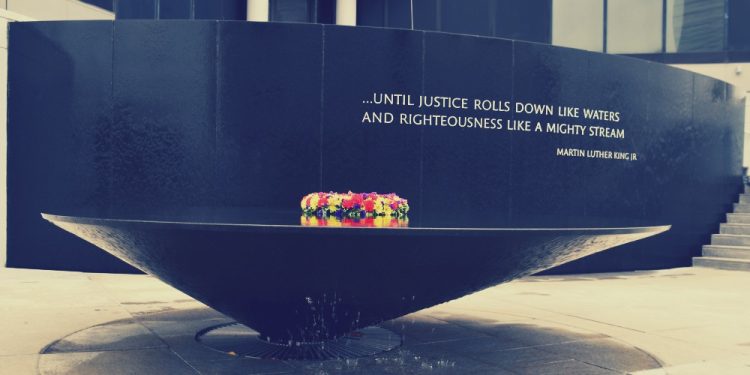Two lawyers with the notorious Southern Poverty Law Center have been in the news in recent weeks. One is facing domestic terrorism charges; the other is votes away from a lifetime appointment to the federal bench.
The SPLC fully supports both lawyers: Thomas Webb Jurgens, a suspected Antifa terrorist arrested and charged for his involvement in a violent riot against the police in Atlanta, Ga., and Nancy Abudu, the SPLC’s director for strategic litigation, whose job involves overseeing all of the SPLC’s legal work – including its special litigation related to “hate groups.” Abudu is currently a nominee for the U.S. Court of Appeals for the Eleventh Circuit awaiting a confirmation vote by the U.S. Senate.
Most organizations would, at a minimum, suspend an employee engaged in potentially criminal behavior, as Jurgens was during the violent attack in Atlanta in early March. But not only has the SPLC allowed him to retain his position, it has failed to condemn the horrific violence.
Within hours of Jurgens’ arrest, the SPLC released a joint statement with another radical group, the National Lawyers Guild. Instead of condemning the violence against police officers that took place, the SPLC denounced Jurgens’ arrest as “part of ongoing state repression and violence” and urged the “de-escalation of violence … against Black, Brown, and Indigenous communities.” The statement is ironic, given that Jurgens was engaged in terroristic and violent behavior toward those who risk their lives daily for public safety, including those from black, brown, and indigenous communities.
Unfortunately, such egregious and violence-inducing actions are par for the course when it comes to the SPLC, which has a long track record of smearing its political opponents and putting them in harm’s way. In 2012, a gunman entered the Washington, D.C., headquarters of the conservative Family Research Council looking to kill as many FRC employees as possible, and shot a security guard. The gunman later told the FBI that he had targeted the Family Research Council because the SPLC had labeled it a “hate group.” Similarly, the gunman who opened fire on Republican lawmakers and nearly killed now-House Majority Leader Steve Scalise in 2017 also followed the SPLC’s work.
The SPLC has also taken aim at public figures. In a February 2019 article titled “Hate Goes to Washington,” the SPLC curated a list of Republican candidates who SPLC said held “open white supremacist, nativist, anti-LGBT or antigovernment” views. This list included myself, as well as my colleagues Josh Hawley and Marsha Blackburn.
It’s not just conservatives who have been on the receiving end of the SPLC’s hatred. In 2018, the SPLC paid a $3.375 million settlement to Muslim reformer Maajid Nawaz, who has devoted his life to advocating for a nonviolent expression of the Islamic faith. The SPLC had included Mr. Nawaz – as well as human rights advocate Ayaan Hirsi Ali – on its so-called “Field Guide to Anti-Muslim Extremists.” In the words of Mr. Nawaz, the SPLC “put a target on my head,” resulting in death threats. And just this week, a federal judge denied SPLC’s motion to dismiss a defamation lawsuit brought against them by a coalition that works to secure our borders, which SPLC has labeled a “hate group,” meaning the case will go to trial.
That’s not all. The internal corruption – including racism, sexism, and sexual harassment – within the SPLC is rampant. In fact, right after Ms. Abudu joined the SPLC as a senior leader, the outfit’s co-founder Morris Dees and longtime president Richard Cohen were both ousted for what employees called “a systemic culture of racism and sexism within its workplace.” According to at least one former staffer who spoke out, the situation there is still every bit as toxic despite a damage control campaign led by political operative Tina Tchen, whose underhanded tactics include running cover for Andrew Cuomo, which has recently come to light.
The violence inspired by the SPLC, not to mention its internal corruption, should disqualify Abudu from a lifetime appointment to the federal bench, given her role as one of the organization’s top lawyers.
Shockingly, when questioned by the Senate Judiciary Committee on which I serve, Abudu repeatedly refused to condemn the SPLC’s violence-inspiring rhetoric. Instead, she repeatedly said how proud she is to work for an organization that has been discredited by investigative journalists and commentators from across the political spectrum for years and what even progressives have dubbed “everything that’s wrong with liberalism.”
I ask my colleagues in the Senate to reflect on the message it would send to the people we represent should we confirm someone from such a corrupt organization to the federal bench.
At a time when it’s often difficult to find points of agreement, surely we can all agree that it’s time to cut ties with the SPLC, its entanglement with racism and sexual harassment, and its campaign of hate and domestic terrorism.
What Would You Do If Pharmacies Couldn’t Provide You With Crucial Medications or Antibiotics?
The medication supply chain from China and India is more fragile than ever since Covid. The US is not equipped to handle our pharmaceutical needs. We’ve already seen shortages with antibiotics and other medications in recent months and pharmaceutical challenges are becoming more frequent today.
Our partners at Jase Medical offer a simple solution for Americans to be prepared in case things go south. Their “Jase Case” gives Americans emergency antibiotics they can store away while their “Jase Daily” offers a wide array of prescription drugs to treat the ailments most common to Americans.
They do this through a process that embraces medical freedom. Their secure online form allows board-certified physicians to prescribe the needed drugs. They are then delivered directly to the customer from their pharmacy network. The physicians are available to answer treatment related questions.





